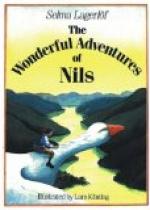The other one turned his head to get the light out of his eyes, and looked about him. “Yes, it is lovely here in Oestergylln,” said he. “Still the best thing about the province is not its beauty.” “Then what is it that’s best?” asked the oarsman. “That it has always been a respected and honoured province.” “That may be true enough.” “And then this, that one knows it will always continue to be so.” “But how in the world can one know this?” said the one who sat at the oars.
The farmer straightened up where he stood and braced himself with the spear. “There is an old story which has been handed down from father to son in my family; and in it one learns what will happen to Oestergoetland.” “Then you may as well tell it to me,” said the oarsman. “We do not tell it to anyone and everyone, but I do not wish to keep it a secret from an old comrade.
“At Ulvasa, here in Oestergoetland,” he continued (and one could tell by the tone of his voice that he talked of something which he had heard from others, and knew by heart), “many, many years ago, there lived a lady who had the gift of looking into the future, and telling people what was going to happen to them—just as certainly and accurately as though it had already occurred. For this she became widely noted; and it is easy to understand that people would come to her, both from far and near, to find out what they were going to pass through of good or evil.
“One day, when Ulvasa-lady sat in her hall and spun, as was customary in former days, a poor peasant came into the room and seated himself on the bench near the door.
“‘I wonder what you are sitting and thinking about, dear lady,’ said the peasant after a little.
“‘I am sitting and thinking about high and holy things,’ answered she. ’Then it is not fitting, perhaps, that I ask you about something which weighs on my heart,’ said the peasant.
“’It is probably nothing else that weighs on your heart than that you may reap much grain on your field. But I am accustomed to receive communications from the Emperor about how it will go with his crown; and from the Pope, about how it will go with his keys.’ ’Such things cannot be easy to answer,’ said the peasant. ’I have also heard that no one seems to go from here without being dissatisfied with what he has heard.’
“When the peasant said this, he saw that Ulvasa-lady bit her lip, and moved higher up on the bench. ‘So this is what you have heard about me,’ said she. ’Then you may as well tempt fortune by asking me about the thing you wish to know; and you shall see if I can answer so that you will be satisfied.’
“After this the peasant did not hesitate to state his errand. He said that he had come to ask how it would go with Oestergoetland in the future. There was nothing which was so dear to him as his native province, and he felt that he should be happy until his dying day if he could get a satisfactory reply to his query.




